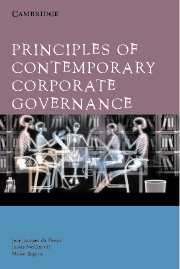Book contents
- Frontmatter
- Contents
- Table of cases
- Table of statutes
- Preface
- PART ONE CORPORATE GOVERNANCE: AN OVERVIEW
- 1 The concept ‘corporate governance’ and essential corporate governance principles
- 2 Stakeholders in corporate governance
- 3 Board functions and structures
- 4 Types of company directors and officers
- PART TWO CORPORATE GOVERNANCE IN AUSTRALIA
- PART THREE CORPORATE GOVERNANCE IN PRACTICE
- PART FOUR CORPORATE GOVERNANCE: AN INTERNATIONAL PERSPECTIVE
- PART FIVE CORPORATE GOVERNANCE: GOING FORWARD
- Index
3 - Board functions and structures
- Frontmatter
- Contents
- Table of cases
- Table of statutes
- Preface
- PART ONE CORPORATE GOVERNANCE: AN OVERVIEW
- 1 The concept ‘corporate governance’ and essential corporate governance principles
- 2 Stakeholders in corporate governance
- 3 Board functions and structures
- 4 Types of company directors and officers
- PART TWO CORPORATE GOVERNANCE IN AUSTRALIA
- PART THREE CORPORATE GOVERNANCE IN PRACTICE
- PART FOUR CORPORATE GOVERNANCE: AN INTERNATIONAL PERSPECTIVE
- PART FIVE CORPORATE GOVERNANCE: GOING FORWARD
- Index
Summary
There is now overwhelming evidence that the board system is falling well short of adequately performing its assigned duties. Without fundamental improvement by individual boards, the entire board system will continue to be attacked as impotent and irrelevant and the boards of troubled and failing companies will, with good reason, increasingly become the targets of not only aggrieved and angry shareholders but also employees, creditors, suppliers, governments, and the public.
David SR Leighton and Donald H Thain, Making Boards Work (1997) 3.A company, in a free market economy, is an economic and social organisation transforming inputs into outputs and exchanging these in the market place. It is therefore at the centre of a complex web of socio-economic relationships. Whilst many of these relationships are circumscribed by law and regulation, the key factors in these relationships are not always obvious, since often many qualitative and non-quantifiable factors need to be considered. The board of directors, as custodian of the company's prosperity, must recognise and evaluate these qualitative factors in much of its decision-making.
UK Institute of Directors, Standards for the Board: Improving the Effectiveness of Your Board (2001) 2.The organs of governance
The Report of the HIH Royal Commission (Owen Report) summarises very well the concept of organs of a corporation in the context of corporate governance. Justice Owen explains that a corporation is a legal entity separate and apart from its directors (one of the primary organs of a corporation) and shareholders (the other primary organ of a corporation) and that it can only ‘act through the intervention of the human condition’.
- Type
- Chapter
- Information
- Principles of Contemporary Corporate Governance , pp. 53 - 69Publisher: Cambridge University PressPrint publication year: 2005



